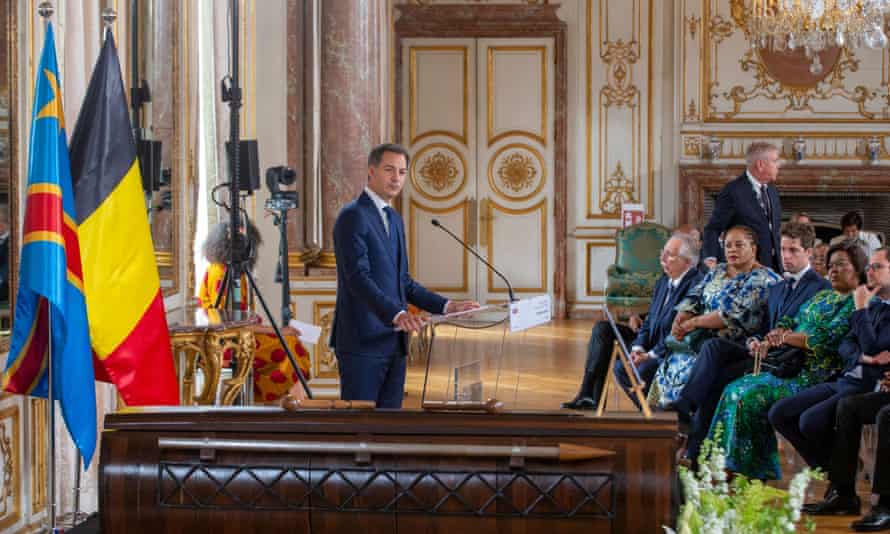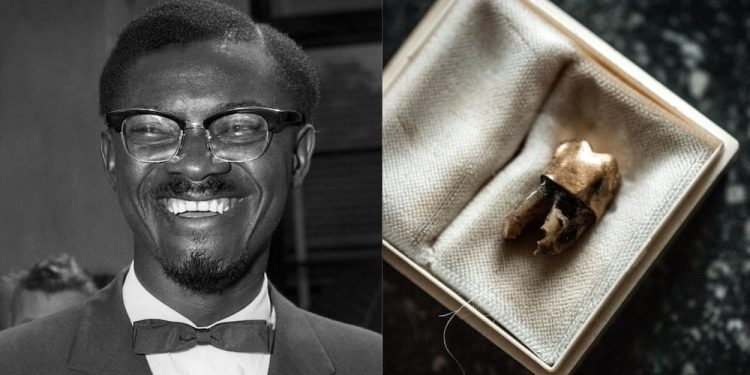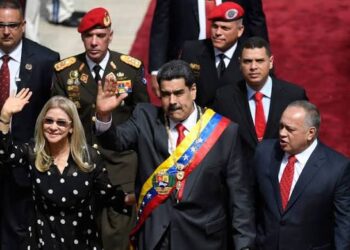Belgian authorities have returned a tooth of the murdered Congolese independence hero Patrice Lumumba to his children, in a new move towards recognition of atrocities that accompanied the country’s brutal exploitation of the former colony.
The relic is all that remains of Lumumba, the first prime minister of the Democratic Republic of the Congo (DRC), under its earlier name the Republic of Congo, and an icon of the struggle against colonialism in Africa, who was murdered by separatists and Belgian mercenaries in 1961. His killers dissolved his remains in acid, though some kept his teeth as macabre mementoes.
The gold-capped tooth was handed in a light blue case to a group of family members at the Egmont Palace in Brussels on Monday morning. It was placed in a casket that will be taken to the embassy of the DRC, as a first step before repatriation.
Lumumba’s son Roland said last week that the return of the tooth meant his family would be able to “finish their mourning”.
By returning the tooth, Belgium is hoping to draw a line under one of the most brutal and shameful episodes in the country’s bloody exploitation of central Africa.
Alexander de Croo, the Belgian prime minister, recognised its “moral responsibility” for Lumumba’s killing. “This is a painful and disagreeable truth, but must be spoken,” De Croo said. “A man was murdered for his political convictions, his words, his ideals.”

Earlier this month, the king of Belgium made his first visit to the DRC, though he stopped short of offering a formal apology. King Philippe expressed “deepest regrets for the wounds of the past”, describing a “regime …. of unequal relations, unjustifiable in itself, marked by paternalism, discrimination and racism” that “led to violent acts and humiliations”.
A charismatic but volatile pan-Africanist who played a key part in the fight for independence, Lumumba became the first democratically elected leader of his country in 1960. Within a year, he had become a victim of cold war politics and internal power struggles, as order collapsed in the new state and rebel groups in the mineral-rich Katanga province sought to break away.
Western officials worried that Lumumba would favour the Soviet Union as a protector and allow Moscow access to strategically critical resources such as uranium.
Following a military coup, Lumumba was jailed, tortured and shot dead by a hastily assembled firing squad. After 40 years, Belgium acknowledged that it bore “moral responsibility” for his death. The CIA had also drawn up plans to kill the 35-year-old politician.
However, it took decades for the truth about the circumstances of Lumumba’s murder to emerge.
In 2000 the Belgian police commissioner Gerard Soete confessed that he had dismembered Lumumba’s body and dissolved the remains in acid. In a documentary screened on German TV, Soete showed two teeth that he said had belonged to Lumumba.
In 2016, a Belgian academic, Ludo de Witte, filed a complaint against Soete’s daughter after she showed a gold tooth, which she said had belonged to Lumumba, during an interview with a newspaper. The tooth was then seized by Belgian authorities.

Lumumba remains for many in the Democratic Republic of the Congo a symbol of what the country could have become after it gained independence. Instead, it became mired in decades of dictatorship and conflict that drained its vast mineral riches.
In Belgium, the international protests against racism that followed the death of George Floyd in the US gave new momentum to activists fighting to have monuments to King Leopold II removed.
The government of the DRC has declared three days of official mourning before the official burial of the tooth in Kinshasa at the end of this month.
Belgium has only recently begun to address the legacy of its exploitation of Congo’s rubber, ivory and timber. As many as 10 million people died from starvation and disease during the first 23 years of Belgium’s rule from 1885, when King Leopold II ruled the Congo Free State as a personal fiefdom. Others were murdered, or deliberately maimed to encourage others to work harder to fulfil impossible quotas of lucrative resources.










Discussion about this post